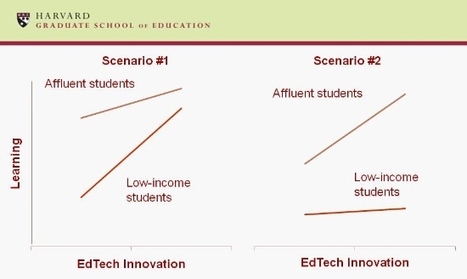I was thwarted by the Harvard system which only allows short comments (3 * twitter post size) without warning you that you will have to chunk down your essay :-) So after posting two parts to the start of my comment the system there decided not to talk to me. So here is my response. Comments here - or there - would be welcome. This is very much about the influence of OER, so on topic for ORIOLE. (My full comment on these graphs and the Harvard abstract follow ...)
An interesting argument to open up here. But wondering how you expect (and why you expect) Scenario #2 to happen as you draw it when your example is ready-to-use OER as opposed to wikis (which require considerable on-going resource from educators if they are to be hosted locally). I accept that well-resourced learners are well resourced so could make more use of OER should they choose to do so, and the same for their teachers. However these students already have many competing demands for their attention in terms of learning options. The well-resourced teachers in scenario #2 would have to be willing to change their teaching (which is already at a high level in your example) to reuse someone else's resources. There is no evidence that reuse will happen at a high, transformational, level in this case. Resource reuse is most likely to happen where there is a gap in the provision, or the offered resource is significantly better than what it replaces. Forgetting OER for a moment, we know this about reusable learning objects, and the behaviour of well-resourced educators with relation to these. They repurposed the resources, or made their own versions, or (most often) preferred their own versions but took new ideas or assets from the RLOs. This was part of what they did in refreshing their teaching, so it was not a huge change, just a boost.
You are also ignoring the opportunity that parents and carers can now direct poorer students to OER. One of the reasons that affluent children do better in school is because of the support of learning at home. For poorer students, where parents may not be well-educated, the great thing about OER is that these are OPEN. Not just the schools can get access. Not only registered students. I wonder at this point how open the wikis you refer to were?
This is an important discussion, it addresses over-hype and perhaps unrealistic expectation of OER (although you are sticking with the developed world here and there is another story to tell globally). However I think that your graphs overstate the case and I am struggling with the comparison of what happens with intra-institutional wikis (if that was what you were looking at) being an indicator for what will happen with OER. I'd suggest a scenario #3 with both rising to some extent but not too much for those who already have good learning resources. After all, access to online all the time via a flashy iPad. smartphone, etc. will not only be used to access education. There is quite a competition for attention going on there from Facebook, YouTube (not the formal educational stuff), etc.
Thanks for raising this.


